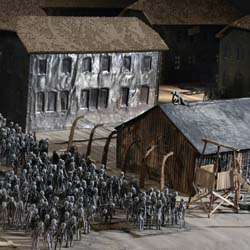KAMP: unease at play

I have to admit to mixed feelings about KAMP, which is on at the Roundhouse as part of the ongoing PuSH Festival. While, I admire the technical wizardry of it all and the attention to detail, I’m afraid its purpose and what it adds to the world is one that leaves me unsure and, maybe, a bit uneasy.
KAMP, created by Hotel Modern from the Netherlands, is recreation of Auschwitz-Birkenau, the Nazi death-camp. The entire floor of the Roundhouse theatre space is taken up with a detailed, miniaturized depiction of the camp, complete with watch-towers, sleeping-quarters, train tracks and the iconic and terrifying sign Arbeit Macht Frei “work will set you free”. The camp’s residents, prisoners and guards alike, are represented by tiny puppets. With their open mouths and slightly caved in heads, these figures evoke Edvard Munch’s Scream. There are three “puppeteers” (Herman Helle, Pauline Kalker and Arlène Hoornweg) although animators might be a better word to describe them. Sometimes a single animator operates an individual puppet – one solitary figure raking a field, a guard in his outpost – sometimes it is all three of them marshalling an entire platoon of puppets to create the scene of the day’s intake disembarking from the train or some massive call to inspection. The animators also take turns filming the puppets with the images projected onto the back wall. This allows the audiences to see up-close what is happening in miniature on the floor (and sometimes what is actually happening inside the structures). There is no dialogue, no direct narrative; instead we are given vignettes from what would seem to be a day at the camp. There is a tremendous soundscape (created by Ruud van der Pluijm) that underscores the work and adds an authentic and sometimes distressing sense to the proceedings. The sound of the puppet raking still remains with me.
The animators as they huddle together or move around the set evoke – I’m sure on purpose – the sense of children at play. They are serious and move with purpose, just as children do when they are playing and working out the logic of the worlds they’ve created. There is perhaps a powerful echo here with our wider culture trying to come to terms with how a modern, industrial society – a society that has so much in common with us today – could descend into such barbarity.
I can live with this as a thesis for KAMP: a manifestation of our unease over our recent past, our inability to let it go and our need to work out the facts over and over again in minute detail. So then why am I uneasy? While I honour the argument that says “we must never forget”, my sense is that this work comes from a deeper, more basic place. The most obvious parallel would be the endless programs about the Nazis that we have on television. This same argument could be applied to, say, Nazi Pets. It is just our culture trying to work through what happened, needing to go over every detail again and again. And perhaps that is what it is, a form of latent cultural trauma. That our parents, grandparents were alive and could have/might have been caught up in these events. And our way of coping with this trauma is programs like Nazi Pets or KAMP. But a lot of people would call Nazi Pets exploitative, wouldn't they?
Then the question must be, is this how a healthy culture (and by culture I mean the Western World) deals with trauma? Is KAMP sophisticated, is it nuanced? I have to say that I hesitate at this point. I want to stress that, unlike the people behind JERK, I believe that the creators of KAMP are coming at this material with honour and respect. I’m just not sure how it adds to our understanding. I suspect that like JERK, the emphasis is on the visceral and emotional experience rather than a specific intellectual argument. Yet, I’ve had these emotional experiences of the death camps already, many times, through movies and television shows, newspaper and magazine articles and books and classes at school. Certainly I left the theatre affected but I’m not sure what this added that was new, beyond a deeper appreciation of what can be achieved through puppets and the lowest of low tech stage craft.
One thing that did strike me as I watched was that I could anticipate every sequence that was about to happen from the train pulling into platform to the shower room; from the piles of clothes to the crowded bunk-beds. No explanation was required; the whole visual dumb show was possible because the images have been cast so deeply into my mind (and I’m sure into the mind of every other audience member). We were working through once more – this time in the company of puppets – events that happened in Germany seventy years ago. But to what end? While the bodies pile up in Haiti, while we surrender our human rights to a foreign agency so some people can ski down a hill, we watch this haunting recreation. And is it really so different from Nazi Pets?
I’m not suggesting it shouldn’t exist or that it is wrong or even (I don’t think) that it is exploitative. I’m just wondering. I am now haunted by the image of puppets pushing bodies into gas chambers. But I was haunted by the reality of those events already.
KAMP continues at the Roundhouse until February 6th. For more information go here.



